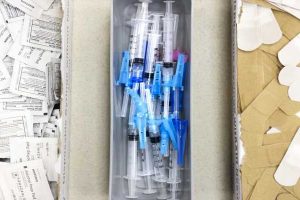Fact check: FDA did not associate Pfizer’s first vaccine dose with COVID-19 infections

The claim: FDA confirms first vaccine dose correlated with increased COVID-19 infections
The science behind vaccines is simple: Introduce the body to a small part of a pathogen, trigger the immune system to build antibodies to fight it off and create a lasting immune memory for any future invasions.
But what if instead of immunity, a vaccine caused disease? That’s a claim one image being shared on Facebook makes, citing the top authority tasked with regulating the safety and efficacy of biological products like vaccines.
“The FDA confirms that the 1st vaccine dose correlates with increased COVID-19 infections,” reads a graphic shared in an April 10 Facebook post.
It goes on to claim a U.S. Food and Drug Administration briefing document reported 409 suspected COVID-19 cases among Pfizer vaccine trial volunteers – versus 287 in the placebo group – seven days post-vaccination.
The original source for the image is a Feb. 21 article by Colleen Huber, an Arizona-based naturopath who runs a cancer clinic offering patients treatment with baking soda, vitamin C and a sugar-free diet instead of chemotherapy. None of these alternative treatments have been proven effective against cancer.
USA TODAY has reached out to Huber for further comment.
Fact check: No, interacting with a vaccinated person won’t cause miscarriage or menstrual changes
Shared widely across social media, her online article has garnered nearly 12,000 interactions on Facebook and 1,100 on Instagram, according to social analytics platform CrowdTangle.
Huber citing the FDA may appear compelling, but there’s quite a bit she distorts. Here’s what we found.
Vaccine side effects, not actual COVID-19 infection
The 409 suspected COVID-19 cases is a real figure mentioned in a Dec. 10 FDA Vaccines and Related Biological Products Advisory Committee briefing document on the Pfizer-BioNTech vaccine trials.
But it doesn’t say these cases were associated with COVID-19, nor were there “increased” infections.
The FDA states the symptoms exhibited by the 409 cases seven days after vaccination are likely symptoms that appear to “overlap with those of COVID-19” but aren’t necessarily actual infection, what the agency characterized as vaccine reactions.
These reactions happen with all vaccines to various degrees They can be local at the site of injection such as muscle pain, itching and redness, or they can affect the entire body like headaches, weakness, fever or chills.
The symptoms may make people feel sick, but they are just physical signs the immune system has been activated, much like the rumble of a started car.
Fact check: Study falsely claiming face masks are harmful, ineffective is not linked to Stanford
None of the COVID-19 vaccines developed can cause illness since the shots don’t contain live virus, only the instructions for the coronavirus spike protein so the body’s immune system can make antibodies against it, according to the Mayo Clinic.
Small number of vaccinated people can still get infected
Vaccination is not a 100% guarantee against COVID-19 infection.
So-called breakthrough infections do occur among fully vaccinated people, but those are expected and also occur with other vaccines, according to the U.S. Centers for Disease Control and Prevention.
According to the CDC, as of April 20, there have been over 7,000 cases of vaccine breakthrough infections among 87 million people vaccinated. The agency is working with state and local health departments to investigate the cases and identify any underlying patterns or variants more likely to make vaccinated people sick.
In clinical trials, both Pfizer’s and Moderna’s mRNA vaccines demonstrated more than 95% effectiveness against severe disease up to six months after the second dose.
As for new variants, both shots appear to be highly protective against the British strain, less but still reasonably effective against the Brazil variant but not as protective against the South African variant. Both Pfizer and Moderna are working on improving their vaccines’ effectiveness, with boostershots targeting the variants.
Our rating: False
Based on our research, we rate FALSE the claim the FDA confirmed the first COVID-19 vaccine doses correlated with increased COVID-19 infections. In a Dec. 10 briefing document, the FDA said 409 potential COVID-19 cases among Pfizer vaccine trial volunteers seven days post-vaccination were likely side effects to the vaccine that appear similar to COVID-19 symptoms, not actual infection.
Our fact-check sources:
- PrimaryDoctor.Org, April 10, “COVID-19 VACCINE Considerations”
- Science-Based Medicine, Sept. 6, 2017, “Naturopathic Cancer Quackery”
- U.S. Food and Drug Administration, Dec. 10, 2020, “FDA Briefing Document Pfizer-BioNTech COVID-19 Vaccine”
- U.S. Food and Drug Administration, April 14, email
- Nature, Sept. 24, 2019, “The how’s and what’s of vaccine reactogenicity”
- JAMA Insights, April 5, “Reactogenicity Following Receipt of mRNA-Based COVID-19 Vaccines”
- The Atlantic, Dec. 18, 2020, “What the Vaccine’s Side Effects Feel Like”
- Mayo Clinic, April 23, “COVID-19 vaccines: Get the facts”
- U.S. Centers for Disease Control and Prevention, April 16, “COVID-19 Breakthrough Case Investigations and Reporting”
- Yale Medicine, April 23, “Comparing the COVID-19 Vaccines: How Are They Different?”
- Healthline, April 23, “COVID-19 Vaccines Are Still Effective Amid Rising Number of Variants”
- Medscape, March 29, “Where Do COVID Vaccines Stand Against the Variants?”
- U.S. Centers for Disease Control and Prevention, April 10, “US COVID-19 Cases Caused by Variants”
- USA TODAY, April 15, “CDC: ‘breakthrough case’ numbers show vaccines work; Pfizer CEO says third shot likely needed within 12 months: Live COVID-19 updates”
- Moderna, Feb. 24, “Moderna Announces it has Shipped Variant-Specific Vaccine Candidate, mRNA-1273.351, to NIH for Clinical Study”
Thank you for supporting our journalism. You can subscribe to our print edition, ad-free app or electronic newspaper replica here.
Our fact check work is supported in part by a grant from Facebook.
Source: Read Full Article
